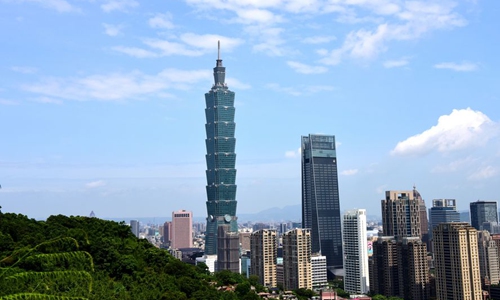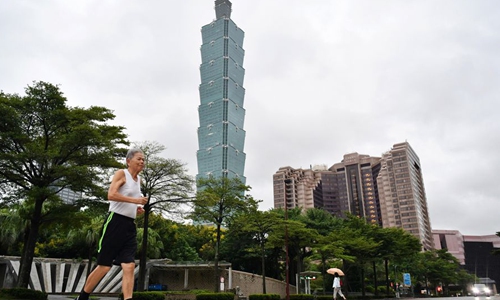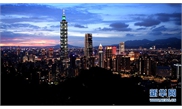US deal with Taiwan may trigger China-US military conflict

Taiwan Photo:Xinhua
To provoke China by playing the “Taiwan card” is not only a strategic approach of the US approved by both Republicans and Democrats, but is also a “dirty business” between Taiwan separatists and US politicians that serves the interests of US defense contractors at the expense of peace and stability in the West Pacific region, said analysts on Saturday.
The draft bill titled "Taiwan Allies International Protection and Enhancement Initiative Act of 2019," or TAIPEI 2019, was passed with a unanimous vote by the US House on Wednesday.
The US Congress has passed several Taiwan-related enabling acts in recent years, including Taiwan Travel Act in 2018 and Taiwan Assurance Act of 2019.
This kind of trick is played frequently by US politicians to provoke China as it costs nothing and can cost Taiwan a fortune by selling weapons to the island, said Li Xiaobing, an expert on Taiwan affairs at Nankai University in Tianjin. “Not only the US Congress and politicians, but also US defense contractors want to get a share in this game.”
Randall Schriver, a former Assistant Secretary of Defense for Indo-Pacific Security Affairs in the US government, visited Taiwan and met with Taiwan regional leader Tsai Ing-wen on February 20.
Tsai praised Schriver’s “contribution” to facilitate significant arms deals of M1A2 main battle tanks ($2.2 billion) and F-16V fighter jets ($8.1 billion) when he served in the Trump administration, according to the VOA.
Schriver is also the co-founder and chairman of Project 2049 Institute, a think tank that, since launching in 2008, has released reports arguing for a harder diplomatic approach toward China.
The think tank takes its name from the year in which US conservative elites believe China plans to supplant the US as the world’s sole global superpower, and also the 100th anniversary of the founding of the People’s Republic of China, and the year that China plans to realize “the great rejuvenation of the Chinese nation.”
Using such a name shows that Schriver wants to make the China-US relationship look like a “time bomb,” and the deadline of the explosion is 2049, so that he can sell panic to policymakers, Li noted.
“For US politicians in Congress, they just need to vote on a few pieces of paper which costs nothing, then they can convince Taiwan separatists that they can buy US support,” Li noted.
“For officials in the US government, they won’t take concrete military or political action as that could cause direct retaliation from China, but they can make Taiwan buy more weapons and provoke China. It is a good deal for the politicians, or some former politicians, as well as defense contractors, but it’s also a tragedy for taxpayers in Taiwan,” he noted.
Taiwan is not just a normal client of US arms makers, but a client that is willing to pay an extremely high price to buy very normal or even outdated weapons, so the profit that US defense contractors can gain from Taiwan is very attractive, said Song Zhongping, a military expert and TV commentator.
According to arms deal data between the US and the island, Taiwan always spends more money to buy US-made weapons such as Patriot missiles and Black Hawk helicopters which are totally incapable of competing with those of the People’s Liberation Army (PLA).
As for M1A2 tanks, many Taiwan-based commentators said they can’t operate on Taiwan’s roads because they’re too heavy, so the areas the tanks can operate in are very limited. So, when the PLA launches attacks, these tanks are just “garbage,” they noted.
When the cross-Straits relationship worsens, there would be a huge opportunity for the lobby groups consisting of US former government officials and politicians to interact between the island and Washington, and there is huge benefit as well, Li said.
The VOA report on Schriver’s visit to Taiwan said that in the future, to what extent Schriver can use his non-official identity of “scholar of civil organization” to push Track II diplomacy [or backchannel diplomacy] between the US and the island would be key.
Corrupt deal
The deal between Taiwan separatists, US defense contractors and ex-US officials is corrupt and also very dangerous as it might shake the foundation of China-US diplomatic ties, and even add risk of a military conflict between China and the US, said both US and Chinese experts.
According to an article published in 2018 by Sludge, a US news website that exposes the hidden influence of lobbyists and special interest groups in creating public policy, reported that the Pentagon’s top official for Asian policy Schriver’s think tank Project 2049 Institute is funded by “defense contractors and foreign governments” including Japanese and South Korean governments, as well as the separatist force which is governing Taiwan.
The article indicated that Schriver is a protégé of Richard Armitage, who served from 2001 to 2005 as Deputy Secretary of State in the Bush Administration under Colin Powell, and Armitage also has his own institution, Armitage International. Employees of Project 2049, according to their LinkedIn profiles, were also simultaneously employed by Armitage International.
In 2005, Armitage left the US State Department to establish his own firm, along with Schriver and other confidantes from the State Department. Armitage International’s website lists Schriver as a founding partner.
As a consulting rather than lobbying firm, Armitage does not have to disclose its clients; however, some of Schriver’s own clients are listed in his mandatory financial disclosure submitted when he was a nominee for the Pentagon position. While at Armitage, his clients included giant US defense contractors such as Raytheon, Boeing and Dyncorp.
Taiwan is the most important contributor to Project 2049 Institute. According to the list of contributions and grants released by the institute, the Taipei Economic and Cultural Representative Office in the US and the “Ministry of National Defense” of Taiwan gave $279,357 in 2017.
In 2016-2017, the funding from the island of Taiwan was about $689,000, which is higher than Japan (about $520,000), South Korea ($10,500) and any US defense contractor.
Li said what Taiwan separatists want to buy is a service that can help them lobby US policymakers to provide more protection.
“The final goal for the Taiwan separatists is to make the US promise to provide military protection when the mainland launches a military operation to reunify Taiwan, but unfortunately, they can never get it from the US no matter how much they pay. US soldiers won’t die for the separatists of the island,” Song said.

A citizen runs in front of the Taipei 101 skyscraper in Taipei, southeast China's Taiwan, on Oct. 1, 2019. (Xinhua/Chen Bin)
A conflict with China
In its 2018 National Defense Strategy the US defined China as a strategic competitor.
The US media Foreign Policy Journal published an article in June 2019 saying that Schriver, who was assistant secretary of defense for Indo-Pacific security affairs at the US Defense Department, introduced in May the Pentagon’s 2019 China Military Power Report, “which deemed that China has embarked on a 30-year program to eclipse the US as the preeminent military power in the Indo-Pacific region.”
Based on “unspecified observations, the Report misunderstood, or purposefully misrepresented, China’s stated goal of becoming a world-class military by 2049 as the fulfillment of the neoconservative fear that China sought to overthrow the US in the global arena,” said the Foreign Policy Journal.
Colonel Lawrence Wilkerson, former chief of staff to former secretary of state Colin Powell, who was interviewed by the journal called the report an exercise in hypocrisy. “This is all about money,” said Wilkerson. “This is a budget ploy.” Wilkerson also warned that the Trump administration’s combative attitude toward China increases the potential for a seemingly “inevitable” fight.
China’s determination to reunify Taiwan is unshakable and the recent situation has made the confidence of peaceful reunification drop dramatically on the mainland as the public feel the people on the island and the politicians generally have a hostile attitude toward the mainland even though the mainland treats them as compatriots, Song said.
“However, the demand for a military solution is rising sharply among the public as they see the PLA’s overwhelming advantage in the region and they are furious with the separatists on the island who poison the cross-Straits relationship. They are even losing faith in the KMT which holds a pro-reunification stance,” Song further said.
So, if the possibility of a peaceful solution totally perishes, a military solution is very likely, and the US and the separatists of the island must understand, no matter how much money they spend, the result of failure won’t change once the PLA launches an attack, he stressed.


